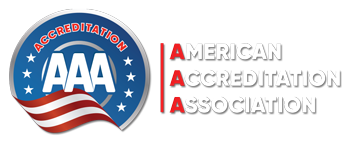Healthcare Accreditation
AAA Accreditation for Health care sector is granted for Hospitals and healthcare facilities that provide care for patients with short length of stay less than 24 hours; this care may be general or specialized, urgent or planned. The services provided in settings such as dialysis centers, day surgery centers, private clinics (i.e. Solo medical care practice), polyclinics, dental care centers, ophthalmology centers, community pharmacies, Medical Travel Providers and others.
AAA provides accreditation to Health care sector according to the ISQua guidelines and principles for the development of health and social care standards. 5th. Edition version 1.0, September 2018
AAA Accreditation for Health care sector is granted for Hospitals and healthcare facilities that provide care for patients with short length of stay less than 24 hours; this care may be general or specialized, urgent or planned. The services provided in settings such as dialysis centers, day surgery centers, private clinics (i.e. Solo medical care practice), polyclinics, dental care centers, ophthalmology centers, community pharmacies, Medical Travel Providers and others.
AAA provides accreditation to Health care sector according to the ISQua guidelines and principles for the development of health and social care standards. 5th. Edition version 1.0, September 2018
AAA is a member of the International Society for Quality in Health Care (ISQua) www.isqua.org , has been working to improve the quality and safety of health care worldwide for over 30 years through education, knowledge sharing, external evaluation, supporting health systems worldwide and connecting like-minded people through the health care networks of health care professionals spans over 70 countries and 6 continents. ISQua’s members are continually working towards quality improvement in health care around the world.
AAA is a member of the International Society for Quality in Health Care (ISQua) www.isqua.org , has been working to improve the quality and safety of health care worldwide for over 30 years through education, knowledge sharing, external evaluation, supporting health systems worldwide and connecting like-minded people through the health care networks of health care professionals spans over 70 countries and 6 continents. ISQua’s members are continually working towards quality improvement in health care around the world.

BENEFITS OF ACCREDITATION
Healthcare accreditation offers numerous benefits to healthcare organizations, patients, and the overall healthcare system. Accreditation involves an external evaluation of a healthcare facility’s quality, safety, and compliance with established standards. Here are some of the key benefits:
Healthcare accreditation offers numerous benefits to healthcare organizations, patients, and the overall healthcare system. Accreditation involves an external evaluation of a healthcare facility’s quality, safety, and compliance with established standards. Here are some of the key benefits:
Accreditation Process
The healthcare facility undergoes an examination of its systems, processes, and performance by peer reviewers or surveyors to ensure that all is conducted in a manner that meets applicable predetermined and published standards. Before the external evaluation, i.e., the survey visit, the healthcare facility is expected to conduct a comprehensive self-assessment to decide on the level of its preparedness and how far or how close it is from achieving full compliance with the standards. Accreditation, therefore, represents a public recognition by the healthcare accreditation body of satisfactory achievement of accreditation standards by a healthcare facility.
The healthcare facility undergoes an examination of its systems, processes, and performance by peer reviewers or surveyors to ensure that all is conducted in a manner that meets applicable predetermined and published standards. Before the external evaluation, i.e., the survey visit, the healthcare facility is expected to conduct a comprehensive self-assessment to decide on the level of its preparedness and how far or how close it is from achieving full compliance with the standards. Accreditation, therefore, represents a public recognition by the healthcare accreditation body of satisfactory achievement of accreditation standards by a healthcare facility.
